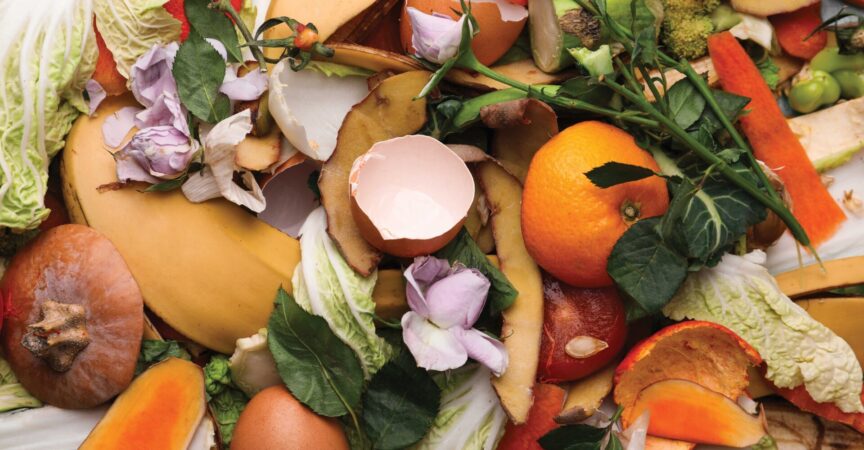From Compliance to Competitive Advantage: Leveraging Sustainability for Growth
MENU in conversation with Jillian Rodak, VP Sustainability, Restaurants Canada
In today’s world, where environmental impact is a critical concern and consumers increasingly demand transparency and eco-conscious practices, the restaurant industry stands at a crossroads. Sustainability is no longer a luxury but a necessity for long-term success. From reducing food waste to adopting circular economy practices, restaurants that embrace sustainable solutions can not only improve their environmental footprint but also enhance operational efficiency, cut costs, and stay competitive in a rapidly evolving market.

Working on behalf of Canada’s foodservice sector, Jillian Rodak, VP of Sustainability at Restaurants Canada explores and helps operators understand the pressing challenges facing the industry—chief among them navigating a complex patchwork of environmental regulations, reducing greenhouse gas emissions, and tackling food waste—and highlights the opportunities for restaurants to lead the way in sustainable innovation. Restaurants Canada, under Jillian’s leadership, is helping operators navigate these changes and realize the opportunities that sustainability can bring.
For restaurant owners and operators, the message is clear: sustainability isn’t just about keeping up with regulations; it’s about driving profitability, resilience, and long-term success in a world beset by fragile economic conditions and vulnerable food systems. Restaurants have the opportunity to lead by example and innovate in ways that not only reduce their environmental impact but also improve their bottom line.
We had the opportunity to connect with Jillian prior to the beginning of her maternity leave, to learn more about the opportunities afforded by sustainability initiatives that are sometimes overshadowed by the complexities of policy and regulation in Canada.
MENU: It’s been wonderful to watch the early success of your new role as VP Sustainability. Can you share a bit about your professional journey and how you ended up at Restaurants Canada?
Jillian Rodak: Absolutely! I’ll try to keep it brief. I studied at Western University and was drawn to humanities, ethics—and particularly business ethics. I attended Ivey Business School but was keen to explore responsible business practices. At the time, only a few of us were passionate about corporate social responsibility, but it was becoming more recognized by the time I graduated in 2010. I knew I wanted to merge sustainability with consulting, and though the opportunities weren’t abundant, I shaped my career around that goal.
In the early days, I created my own internship opportunities with social purpose organizations and wrote a lot about sustainability.Eventually, I landed at Deloitte Canada, where I spent six years immersed in sustainability consulting for some of Canada’s largest companies. The food system has always fascinated me, which is what led me to Restaurants Canada—a place where I could combine my passion for sustainability with my love for the restaurant industry.
MENU: It seems like you had a clear sense of the need for sustainable business practices early on. What drives that passion?
JR: I’ve always been deeply passionate about human rights and social justice. My grandparents were Holocaust survivors, and that profoundly influenced me growing up. Their experiences gave me a keen sense of responsibility toward human rights and the social aspect of sustainability. Combine that with my love for business models and making things work efficiently, and sustainability became the perfect intersection of my values and professional interests.
Sustainability isn’t just a professional focus for me—it’s personal. I see the way business and sustainability can coexist to drive both profitability and positive social outcomes. That has driven my career, and it’s why I’m so excited to be working with Restaurants Canada.
Sustainability in the Foodservice Industry
MENU: As the first person in this role at Restaurants Canada, what’s your vision for sustainability in the industry?
JR: For much of my career, sustainability in the private sector has been driven by consumer demand, reputation and its impact on the bottom line. But now, policy is the biggest driver. Many restaurants see these policies as a threat to their business, and my role involves advocating for our members and helping them navigate these changes.
At the same time, I aim to guide them toward seeing sustainability as an opportunity—whether it’s through cost savings or new revenue streams. I believe the restaurant industry can be a leader in sustainability innovation. It’s not just about compliance; it’s about future-proofing their businesses.
MENU: There’s certainly a lot of pressure on restaurants, especially smaller businesses. What are the main challenges they face when it comes to sustainability?
JR: One of the biggest challenges is the patchwork of legislation around plastics and packaging. Different cities and provinces have varying laws, which adds complexity, time and cost to operations. For larger chains that rely on scalable models, adjusting operations based on local regulations can be particularly challenging. Consistency is something we’re advocating for on behalf of our members.
Another major challenge is infrastructure. Recycling and composting systems vary widely across Canada, making it difficult for restaurants to implement scalable solutions. Even when they want to reduce waste or switch to more sustainable packaging, the lack of uniform infrastructure complicates things.
MENU: That’s frustrating and overwhelming. How are you helping restaurants navigate these challenges?
JR: We focus on meeting restaurants where they are and taking small, achievable steps. Sharing success stories is a big part of that. For example, some restaurants are partnering with third-party reusable takeout container companies, and customers are responding positively. By highlighting these real-world examples, we can inspire other businesses to adopt similar practices.
We’re also facilitating conversations between restaurants and regulatory bodies to ensure there’s clarity around policies and opportunities for input. It’s important to make sure our members feel heard and that they understand the business benefits of sustainability—not just the challenges.
Tackling Food Waste
MENU: Food waste is a major concern, both from a sustainability and a financial perspective. What are some ways restaurants are addressing this issue?
JR: Food waste is a huge opportunity for the industry. Many operators are already optimizing their forecasting and portion sizes to reduce waste from the outset. Some are repurposing surplus food into new menu items—one of our members, for example, uses leftover ingredients from certain dishes to create entirely new offerings, ensuring nothing goes to waste.
Training staff is another effective strategy. Many restaurants are streamlining kitchen operations to reduce waste and improve sorting practices. This often involves educating kitchen staff on food waste reduction techniques and creating clear procedures for sorting compostable and recyclable materials.
Many operators are diverting food waste to help address food insecurity in their communities, partnering with local food banks and providing either valuable ingredients or nutritious, ready-to-serve meals.
We’re also seeing a surge in partnerships with food surplus apps, which connect restaurants with customers who purchase leftover food at a discount. This reduces waste while offering consumers affordable meals. Some restaurants are even participating in used cooking oil recycling programs to convert waste oil into biodiesel, further reducing their environmental footprint.
The Circular Economy and Innovation
MENU: Speaking of waste, how does the concept of a circular economy apply to the restaurant industry?
JR: A circular economy is about shifting from a linear, take-make-waste model to one where resources are optimized, and waste is minimized throughout the entire value chain. For restaurants, this means thinking about everything from food waste to packaging and working to keep materials in use for as long as possible.
We’re seeing restaurants innovating with fibre-based packaging, exploring ways to extend the life of materials, and even partnering with suppliers to reduce waste at the sourcing level. But for circularity to truly take hold, we need collaboration across the entire supply chain—from suppliers to waste management companies. It’s a complex journey, but the potential is huge.
MENU: What excites you most about the opportunities ahead?
JR: The innovation potential. We’re already seeing progress in things like recyclable and compostable packaging, and there’s so much more we can do. The restaurant industry is incredibly adaptive, and I believe it has the power to drive real change. The key is to focus on tangible solutions that are accessible and affordable for businesses, including small and medium-sized ones.
Greenhouse Gas Emissions and the Road Ahead
MENU: Greenhouse gas (GHG) emissions are another pressing issue. How do you see this affecting the restaurant industry?
JR: Many of our larger members are already working on measuring and reducing their GHG emissions, especially those with international ties. Canada is expected to introduce its own version of international GHG reporting standards soon, which will likely apply to larger companies initially. For smaller businesses, the impact will come later, but it’s definitely something they need to be aware of.
At Restaurants Canada, we’re looking at how we can help restaurants start assessing their emissions at a basic level and identify opportunities to reduce them. We see this as a huge opportunity not just for environmental impact but for cost savings as well.
MENU: Looking ahead, what trends do you see having the biggest impact on sustainability in the restaurant industry over the next five years?
JR: Beyond the circularity piece we discussed as the main focus for the next few years,
I see food waste reduction and emissions as major focus areas. The restaurant industry is in a unique position to lead on supply chain transparency, ensuring that customers know where their food comes from and that it’s ethically sourced. We’re also going to see more attention on human rights in supply chains, as more businesses comply with Canada’s Modern Slavery Act.
The industry has made a lot of progress, but there’s much more to come. The next five years will be pivotal, and I’m excited to see how we evolve.
Although Jillian has begun her maternity leave, she will return next fall to continue leading these vital efforts for the industry. In her absence, there is a strong team in place at Restaurants Canada to continue the momentum and continue to shape the future of sustainability in foodservice.
If you have any questions in the meantime, please reach out to sustainability@restaurantscanada.org









